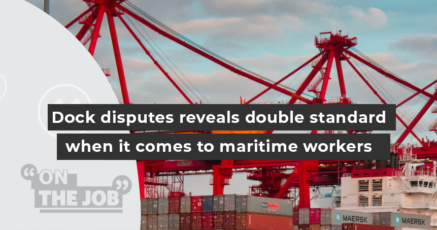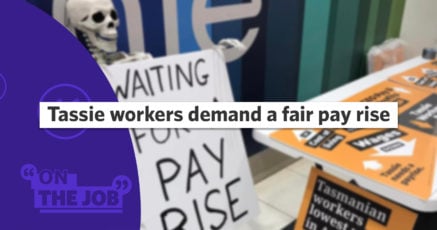Shane Roulston has seen enough of how Australia’s agriculture industry treats its foreign visa workers to not be afraid to call it as he sees it.
“It might not be technically slavery, but it’s pretty bloody close,” the Australian Workers Union national organiser for agriculture and horticultural industries told On the Job.
The AWU is ramping up its campaign against the Morrison government’s latest move to provide readily available, cheap visa workers for Australian farms and agricultural industries.
The recently proposed ASEAN Agriculture Visa doesn’t address any of the long-standing claims that Australia’s farm sector is rife with worker exploitation.
Roulston is alarmed that nothing has been done to address the issue.
“Visa workers in the agriculture and horticultural sectors in Australia are some of our most vulnerable workers.”
“There’s that power imbalance that is undeniable. If they don’t do what they’re told, if they don’t accept what they’re offered, then they are threatened with having their visa cancelled, and knowing that their families might be banned from sending anyone else who is connected with them.”
That ever-present threat of termination means that bad employers always hold the whip hands according to Roulston.
“It is part of the underlying reason why many employers in the sector intentionally and deliberately underpay, because they know they can get away with it,” he said.
The AWU’s claims are backed up by a 2021 report from the Migrant Workers Centre that found:
- Almost two-thirds of workers had experienced wage theft
- A quarter of workers surveyed were pressured to work without breaks, perform overtime work, and work on public holidays
- Only 13.5 per cent of respondents managed to secure permanent residency after their arrival
Roulston says Scott Morrison’s government has no excuses for not tackling this issue head on.
“The government has been aware of the problem for at least the last five years. The Fair Work Ombudsman has been well aware of the problem for longer,” he said.
“There’s been dozens and dozens of reports – by academics, the Fair Work Ombudsman, industry and Senate inquiries – that have all shown that those workers are routinely exploited.”
The AWU now believes that exploitation of visa workers is no longer an outlier: it has become standard practice in an industry-wide race to the bottom.
“It’s not the exception to the rule anymore, it is now the majority of those employers or biotech companies and farmers in the sector who do it, because they feel they have no choice,” Roulston said.
“They want to compete because that’s what everyone else is doing. And that’s what the government’s allowed that to happen last seven or eight years.”
Several workers were prepared to risk of reprisals and addressed the Senate Select Committee on Job Security in the past week.
One worker told the inquiry, “I came to Victoria; to Mildura to work on grapes. I came here to work for money. I didn’t come here to work as a slave. It should give me a better life, and that’s why I fight for my people.”
Another worker told the inquiry that in one 64-hour work week his wage totalled $100 and that he had to share a kitchen with 60 other workers.
“We contribute a lot in this economy, we need fairness, you should treat us like Australians,” another worker told the Senate Committee.
These stories align closely with the testimonies visa workers have shared with the United Workers Union.
Visa worker Sharmini told the UWU, “On some farms, workers can be sent into the field when it’s over 40 degrees.”
“In that temperature you’re lifting heavy loads, and sometimes there’s no toilet. No water,” she said.
Roulston is furious that a culture of exploitation of migrant workers has become so routinely embedded in Australia.
“If the industry was paying well, it would attract Australians to work in the industry, but the truth is Australian workers won’t work for that,” he said.
“If you were an Australian worker on a farm and you’re getting paid $2 an hour you’d tell you tell your boss where to shove it.”
The AWU has started working with corporate giants like Coles and Woolworths to ensure their supply chains are built upon decent labour practices where workers are paid the award rates.
The problem is, with the critical mass of employers now locked into the visa worker exploitation racket, it’s becoming harder for recent employers to compete.
Roulston is adamant that the decency of working Australians needs to be brought to bear.
“I think most Australians are willing to pay an additional four or five percent knowing that produce which they buy from the from the shops has been picked by people who are paid the award wage – not $3 an hour,” he said.
“They are decent people who would have no problems paying a little bit extra for their fresh fruit and veg knowing that those workers are not going to be routinely exploited.”













SHARE:
Exploitation still the main harvest for visa workers